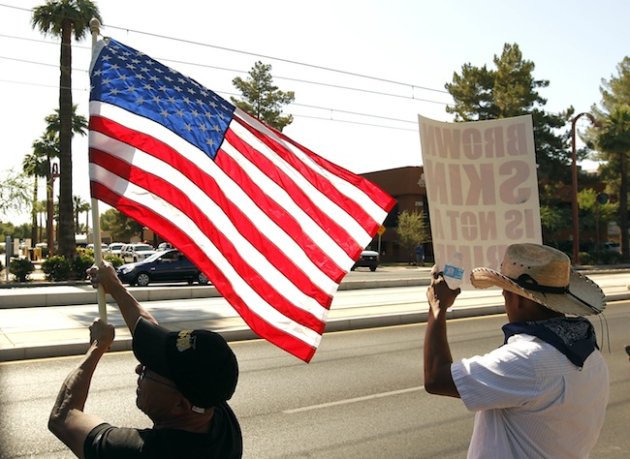 Immigrant rights protesters on Monday in Phoenix. (Ross D. Franklin/AP)
Immigrant rights protesters on Monday in Phoenix. (Ross D. Franklin/AP)
Arizona began implementing the piece of its anti-illegal immigration law that survived the Supreme Court's ruling on Monday, requiring police officers to verify immigration status during routine stops if they have a "reasonable" suspicion that someone may be in the country illegally.
Arizona tells police officers to look for specific signs that indicate they should ask for immigration papers when stopping a person. These signals include lack of a license, driving a car with foreign plates, difficulty speaking English and seeming nervous. Officers must be careful not to stop someone for more than a "reasonable" amount of time while verifying his or her status, however, or the inquiry could violate the stopped person's rights. Gov. Jan Brewer says officers have been trained not to racially profile while implementing the new law.
[Related: Scalia blasts Obama's deportation stay]
But Tucson police Chief Roberto Villasenor told the Los Angeles Times he worries his department will be flooded by lawsuits from people who say they were improperly questioned about their status, or held for too long. Under the law, Villasenor estimates that Tucson will make 50,000 additional calls to the federal government each year to verify status. Officers will have to hold people whom they would usually just cite and let go while they verify immigration statuses, he added.
These extra calls will present "operational challenges," an Obama administration official who declined to be named told reporters on Monday. But the federal government has no plans to change how it operates in any way due to the law, he added. "We will not allow a state to dictate our priorities," the official said.
[Slideshow: Arizona immigration protests]
When an Arizona police officer calls to verify a suspect's immigration status, the federal government will decide to hold someone only if the person has committed serious crimes or is a recent or repeat border crosser. An Arizona officer will be forced to let that person go if the federal government doesn't want him or her and if the officer doesn't have a crime to charge the person with.
In a rebuke to Arizona, the Obama administration also ended an agreement Monday that allowed some specially trained local police in the state to enforce immigration laws.
No comments:
Post a Comment